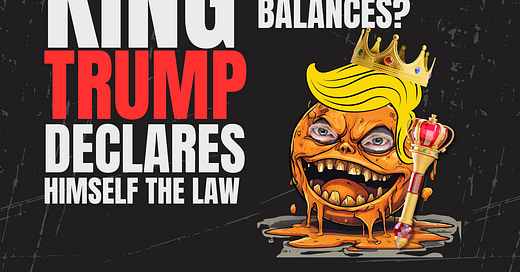Donald Trump’s latest executive order isn’t about “restoring accountability”—it’s about consolidating power in a way that should terrify anyone who cares about democracy. With a stroke of his pen, he’s trying to strip independent agencies of their autonomy, seize control over regulatory decisions, and—perhaps most dangerously—declare that only he and his Attorney General have the authority to interpret the law.
The Details: What This Executive Order Actually Does
This executive order fundamentally reshapes the balance of power in the federal government by:
Eliminating the Independence of Federal Agencies – Independent agencies like the Federal Trade Commission (FTC), the Federal Communications Commission (FCC), and the Securities and Exchange Commission (SEC) exist to function outside of direct presidential control. They are designed to enforce laws based on expertise and fairness, not political pressure. By subjecting them to White House oversight, Trump is turning them into extensions of his will, undermining their ability to regulate industries and protect consumers.
Centralizing Legal Interpretation Under Trump and His Attorney General – One of the most chilling aspects of this order is that it asserts only the President and the Attorney General (under the President’s direct control) can interpret federal law for executive agencies. This removes the ability of regulatory bodies to rely on their own legal teams, effectively erasing independent legal analysis. This means laws will mean whatever Trump wants them to mean, with no room for dissent. It also removes the role of judicial review, effectively placing Trump’s administration above the law.
Controlling Agency Funding Through the White House – The order allows the Office of Management and Budget (OMB) to alter the apportionments of so-called independent agencies, effectively giving the White House the ability to withhold or redirect funds. This is a direct challenge to Congress’s constitutional power of the purse. Under Article I, Section 9 of the U.S. Constitution, only Congress has the authority to allocate federal spending. Trump’s attempt to exert control over agency budgets violates that fundamental principle, potentially allowing him to punish agencies that don’t fall in line with his political agenda.
Weakening Oversight and Accountability – Independent agencies were created to serve the American people, not the whims of any one administration. By forcing agencies to submit draft regulations for White House review, this order allows Trump to bottleneck or outright kill policies that don’t serve his interests. Even worse, agencies will now have to align their strategic plans with White House directives, meaning decisions that should be based on expertise and public interest will instead be dictated by partisan politics.
Why This Is a Constitutional Crisis
This executive order is a direct attack on the checks and balances that define our government. It’s an attempt to erase the separation of powers and consolidate control under one man. Historically, independent agencies have existed to protect regulatory decisions from political manipulation. Trump’s move undermines that tradition and sets a dangerous precedent for unchecked executive power.
Legal experts across the political spectrum have raised alarms. Even the Supreme Court has historically defended the independence of agencies, recognizing their role in maintaining a fair and functioning government. By attempting to override decades of legal precedent, Trump is effectively dismantling constitutional governance.
Can Congress Stop This?
Congress holds the power to challenge this order, but let’s be honest—I have very little faith that a body controlled by Trump’s GOP cronies will do anything to rein him in. While Democrats may attempt legal challenges, Republicans have shown time and time again that they are more interested in enabling Trump than in upholding the Constitution. And with a conservative-packed judiciary, any legal challenges face an uphill battle.
The real issue here is that this move directly undermines the legislative branch’s constitutional power. Congress—not the President—has the power to write laws and control funding. If Congress allows this power grab to stand, it is effectively surrendering its authority and reducing itself to a rubber stamp for Trump’s autocratic ambitions. The real question isn’t whether Congress can stop this—it’s whether they will.
What Comes Next?
The fight against this power grab is just beginning. Lawsuits will likely be filed, and it’s possible that courts could strike down parts of the order. But that will take time, and in the meantime, Trump is actively reshaping the federal government to serve his personal interests.
The longer this stands unchallenged, the more damage it does. If we let one president claim absolute control over the executive branch—including independent agencies meant to function outside of political interference—what stops the next president from taking it even further?
The American people didn’t elect a king. It’s time we remind Trump of that fact before it’s too late.
Sources:
U.S. Constitution, Article I, Section 9
"The Independent Agency Problem," Harvard Law Review
Supreme Court rulings on agency independence (Humphrey’s Executor v. United States, 1935)
Congressional Research Service report on executive authority and agency independence




